- Home
- T1-1 PARTICIPANT LIST FOR ONE HEALTH MALAWI
Participant List for One Health Malawi
Participant List for One Health Malawi
Presently, the Public Health Institute of Malawi (PHIM) coordinates One Health activities in Malawi. Lilongwe University of Agriculture and Natural Resources (LUANAR) is the country multiplier who take the lead in implementing COHESA project activities (One Health Observatory*) and help build the capacity of the country to address One Health Malawi issues.
The contributing organisations to COHESA are:
* The One Health Observatory was set up by the COHESA project (Capacitating One Health in Eastern and Southern Africa) as a one-stop shop for information and resources on One Health in Eastern and Southern Africa.
The list below points to OHMW participating organisations under the COHESA umbrella
|
|
|
The One Health Malawi website is divided into 5 main structures:
|
|
|
OHMW Roadmap Objective – Governance and Coordination
Develop objectives, strategies, activities, and a timeline that provides guidance to create a OH Policy AND Strategy for the effective implementation of multisectoral approaches to promote the health of humans, animals, plants, and ecosystems and to prevent and manage risks at the human-animal-plant-environmental interface.
This is still a draft, please contact the webmaster if you wish to participate in designing the OHMW Roadmap. The webmaster will put you in touch with the contact person, via email.
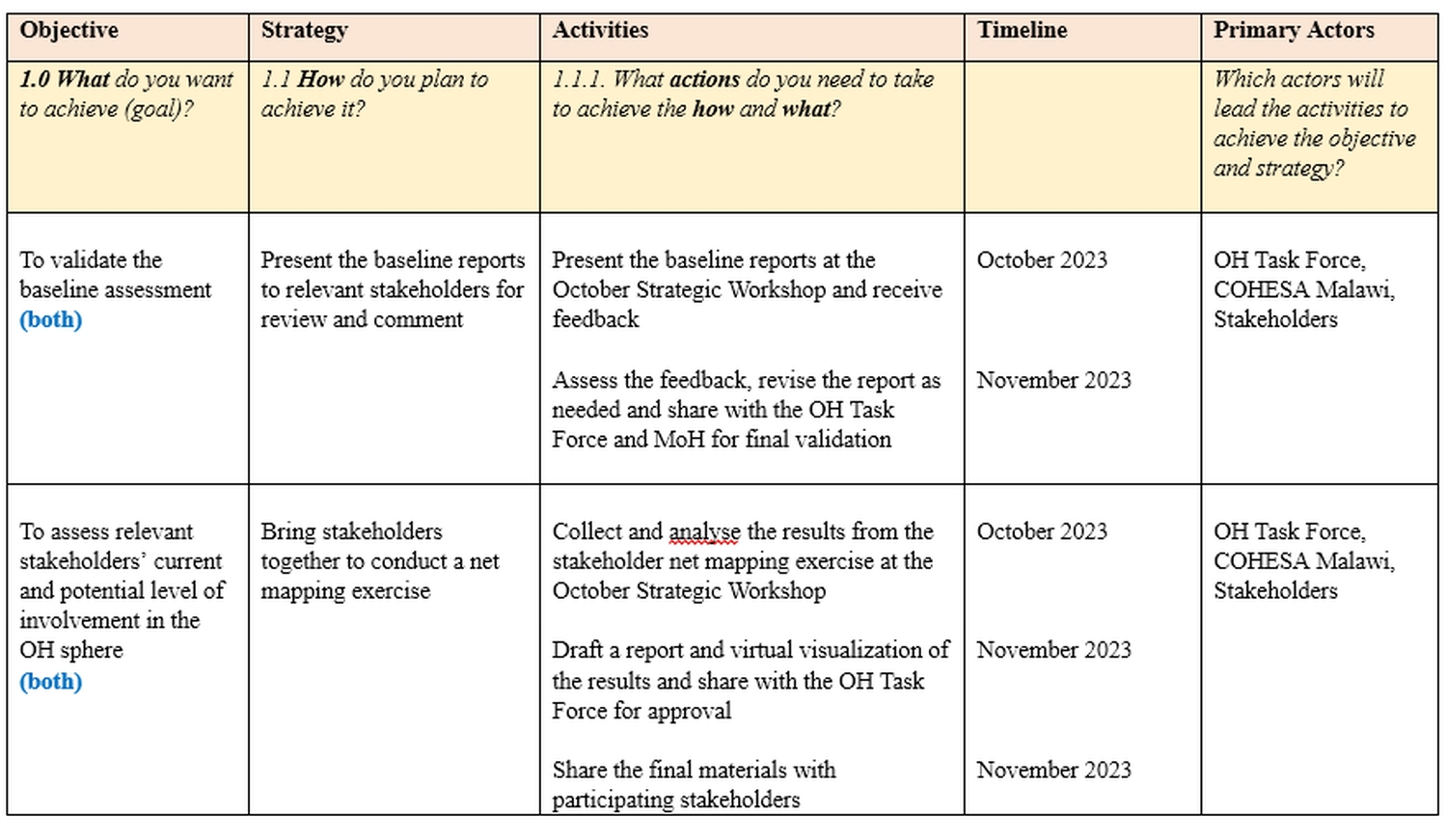
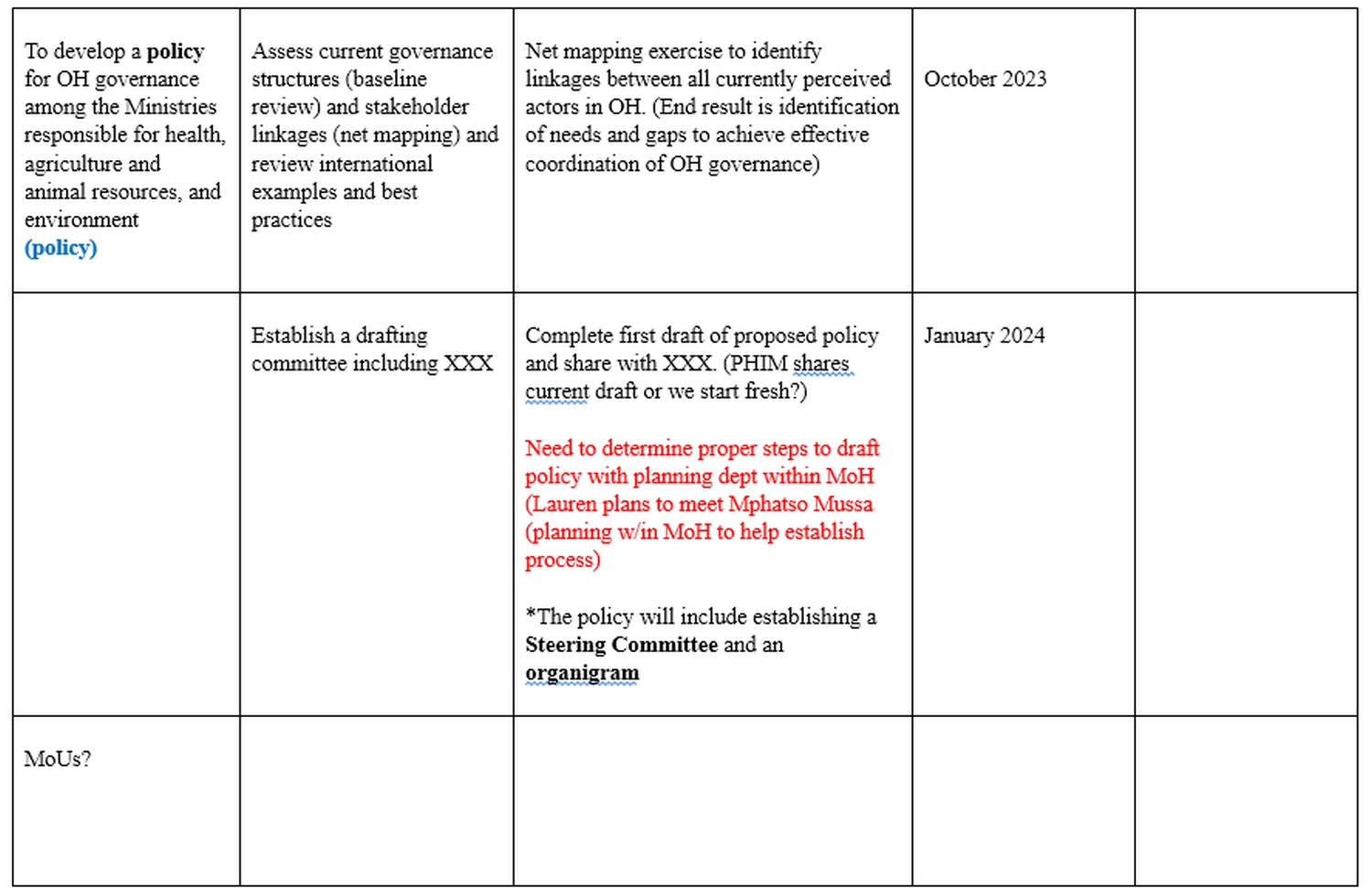
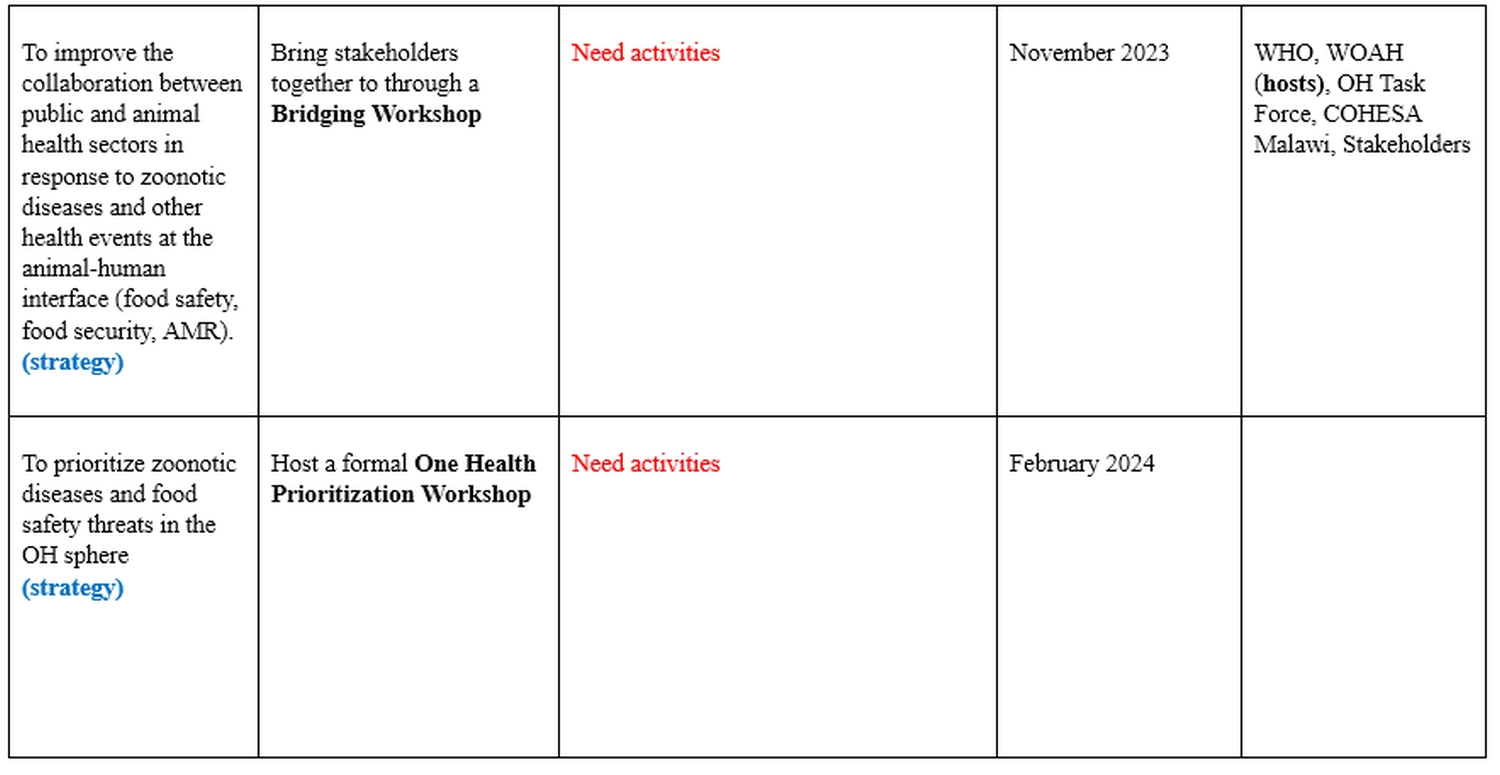
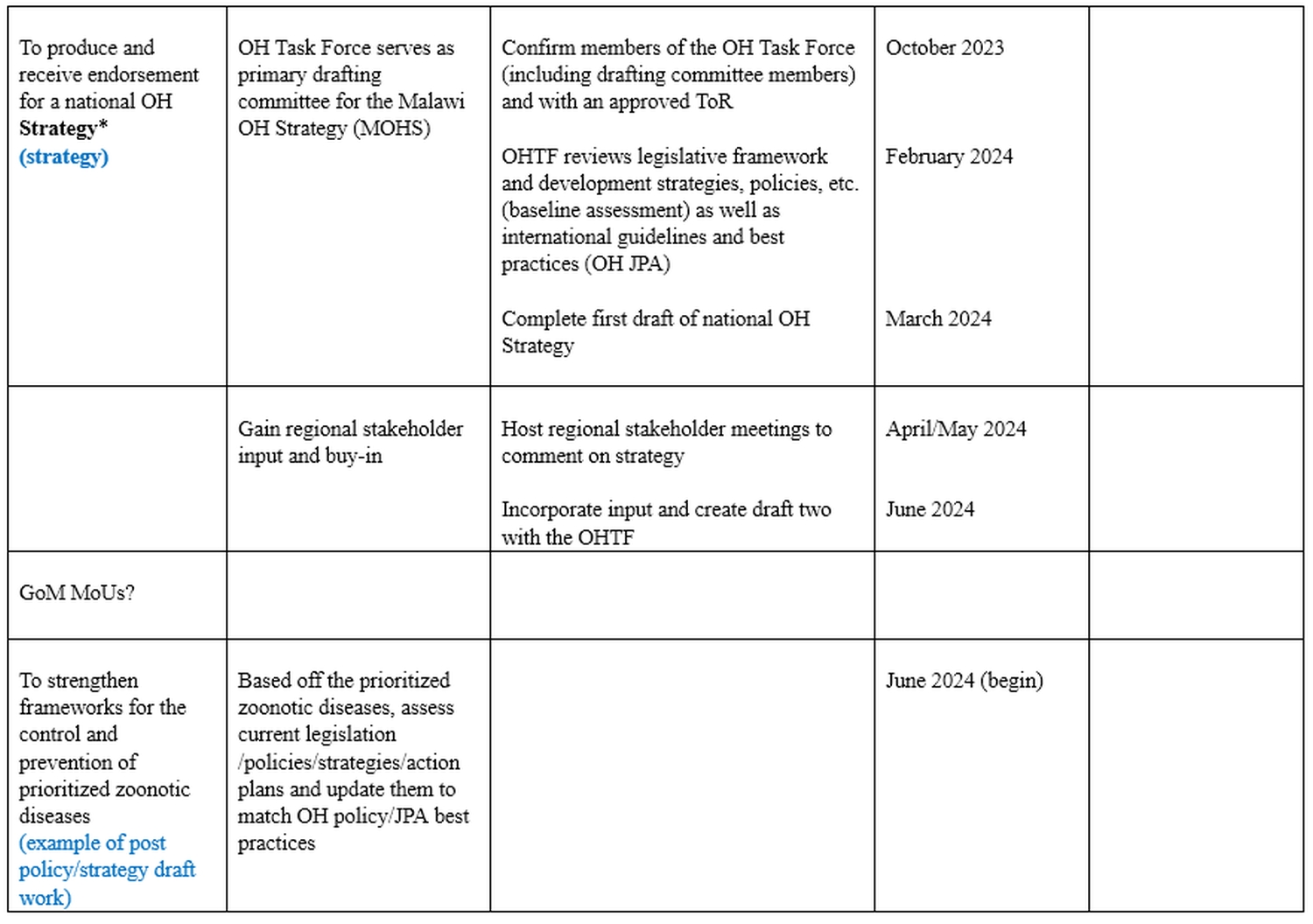
Updated 5 December 2023
- *OH Policy
- *OH Country Strategy 2024/5-2026/7 (aim to complete the final version of the OH Strategy by end of 2024). The OH Strategy will include: an explanation of OH, intl guides, reference to the baseline assessment in preparation for drafting, documents reviewed in drafting the strategy; a mission, vision, goals, objectives, activities and a work-plan (timeline for implementation) including plans to amend/update chosen OHZDPs, any legislation …
The list below points to other known OHMW participating organisations under their own umbrella
|
How to Create Pathways Towards One Health
"How to" or guidance pathways towards a One Health policy.
One Health Joint Plan of Action (2022‒2026)
- The Quadripartite Organizations – the Food and Agriculture Organization of the United Nations (FAO), the United Nations Environment Programme (UNEP), the World Organisation for Animal Health (WOAH, founded as OIE), and the World Health Organization (WHO)
A subject by subject One Health policy framework approach
- Key Subjects for a One Health Malawi Governance Framework
Informal Holistic Approach
- Permaculture
One Health Training
- From COHESA - ONE HEALTH Training around the World
- From MISC - ONE HEALTH Training around the World
One Health Activities in Nearby Countries
Reference information from neighbouring countries:
One Health - WHO
'One Health' is an integrated, unifying approach to balance and optimize the health of people, animals and the environment. It is particularly important to prevent, predict, detect, and respond to global health threats such as the COVID-19 pandemic.
The approach mobilizes multiple sectors, disciplines and communities at varying levels of society to work together. This way, new and better ideas are developed that address root causes and create long-term, sustainable solutions.
One Health involves the public health, veterinary, public health and environmental sectors. The One Health approach is particularly relevant for food and water safety, nutrition, the control of zoonosis (diseases that can spread between animals and humans, such as flu, rabies and Rift Valley fever), pollution management, and combating antimicrobial resistance (the emergence of microbes that are resistant to antibiotic therapy).
One Health History
Calvin Schwabe, a veterinarian trained in public health, coined the term "One Medicine" in a veterinary medical textbook in 1964, to reflect the similarities between animal and human medicine and stress the importance of collaboration between veterinarians and physicians to help solve global health problems. He established a department at University of California, Davis to jointly address issues in the animal and human health sciences.
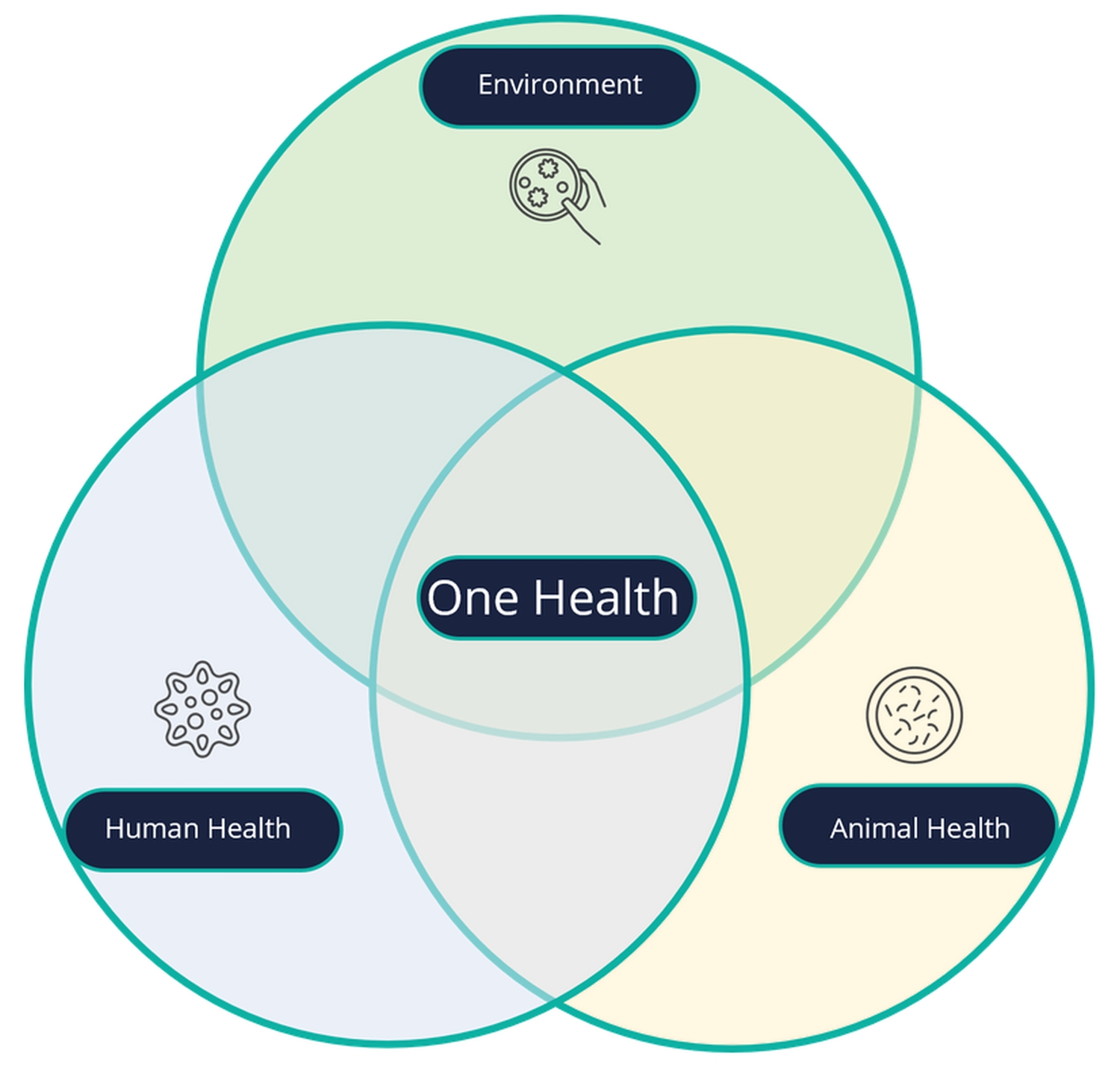
In 2004, The Wildlife Conservation Society held a conference at Rockefeller University in New York called "One World, One Health". Out of that conference the twelve Manhattan Principles were created to describe a unified approach to the prevention of epidemic diseases. These principles emphasized links between humans, animals, and the environment; their importance in understanding disease dynamics; and the need for interdisciplinary approaches to prevention, education, investment, and policy development.
Due to global scares surrounding the H5N1 influenza outbreaks of the early-mid 2000s, the American Veterinary Medical Association established a One Health Initiative Task Force in 2006, the American Medical Association passed a One Health resolution to promote partnering between veterinary and human medical organizations in 2007, and a One Health approach was recommended for responses to global disease outbreaks in 2007. Building on these initiatives, the Food and Agriculture Organization (FAO), World Organization for Animal Health (OIE), and World Health Organization (WHO) came together with the United Nations Children's Fund (UNICEF), United Nations System Influenza Coordination, and the World Bank to develop a framework entitled "Contributing to One World, One Health-A Strategic Framework for Reducing Risks of Infectious Diseases at the Animal-Human-Ecosystems Interface” in 2008, reiterating recommendations for a One Health approach to global health. This framework was expanded and implementable policies developed at Stone Mountain, Georgia in May 2010. International meetings with the topic of One Health were held in 2011 in Africa and Australia.
In 2012, Barbara Natterson-Horowitz, a physician, and Kathryn Bowers, a science journalist, published the book Zoobiquity, coining the term as they drew parallels between animal and human health through vivid case studies. They called for the biomedical scientific and clinical communities to rediscover comparative medicine and reexamine human and animal health in terms of evolution and the environment. A New York Times bestseller, the book has been described as "easy to read and entertaining" in its presentation of ideas similar to the "One Health" concept, but also criticized as lacking depth and failing to recognize the extent to which animals and humans have differently evolved as complex systems.
In 2016, The One Health Commission, One Health Platform, and One Health Initiative Team deemed International One Health Day to be November 3.
In 2019, Senator Tina Smith and Representative Kurt Schrader introduced the Advancing Emergency Preparedness Through One Health Act into the United States Senate and House of Representatives, respectively. This bi-partisan piece of legislation would require that the Department of Health and Human Services, Department of Agriculture, and other federal agencies develop a coordinated plan to create a One Health Framework to help prepare responses to zoonotic disease and prevent disease outbreaks.
One Health in United States of America
The One Health Initiative is an interdisciplinary movement to create collaborations between animal, human, and environmental health organizations including the
- American Veterinary Medical Association
- American Medical Association
- Centers for Disease Control and Prevention
- United States Department of Agriculture
- Vétérinaires sans Frontières/ Tierärzte ohne Grenzen
- United States National Environmental Health Association, among others.
Such collaboration, which often remains very limited, could lead to more quick and profound exchange of knowledge and insights between disciplines and professionals, which is important to better and more rapidly respond to outbreaks and newly emerging zoonoses and diseases.
One Health Commission
In 2007, Roger K. Mahr from the American Veterinary Medical Association, Jay H. Glasser from the American Public Health Association, and Ronald M. Davis from the American Medical Association came together as liaisons with other health science professionals, academics, students, government workers, and industry scientists to create a task force and have teleconferences to discuss One Health.
This One Health Initiative Task Force created a report in 2008 which outlined recommendations to create a joint steering committee, implement improved communications efforts, plan national One Health studies, develop a One Health Commission, create advisory teams, establish national meetings, and engage medical, veterinary, and public health students.
The One Health Commission (OHC) was chartered in Washington, D.C. in 2009 as a 501(c)3 non-profit organization. Its mission is to connect individuals and create relationships across human, animal, and environmental health sectors, as well as to educate the public about these issues with the intent to improve global health. Roger Mahr was the founding CEO.
A request for proposal for an institutional partner was put forth in 2010, and Iowa State University was selected to be the main site for operations. In 2013, Roger Mahr retired from the commission and the operations site moved to the Research Triangle of North Carolina, where it currently resides. The current executive director is Cheryl Stroud, a veterinarian, who has held the position since 2013.
The One Health Commission began in 2014 compiling a Who's Who in One Health, a Directory of organizations around the world that are actively working to further the One Health paradigm shift. The OHC also oversees a Global One Health Community listserv. In addition the commission has a webpage known as the One Health Library with many types of resources available on the topic of or connected to One Health.
You can read about the One Health Commission Strategic Action Plans here.
One Health Platform
The One Health Platform is a scientific reference network to unite researchers and experts to better understand and prepare for zoonotic disease outbreaks from animals to humans, and antimicrobial resistance, including a better understanding of environmental factors that impact disease dynamics. The management board is made up of Ab Osterhaus, John Mackenzie and Chris Vanlangendonck.
The organization has nine objectives
- Disseminating research results at biennial meetings
- Identifying knowledge gaps in the field
- Engaging policy makers
- Establishing a Bio Threats Scanning Group to connect One Health and global health security
- Share data
- Serve as a reference network to the government
- Foster collaborations
- Implement policies
- Increase awareness during One Health Day
The One Health Platform was responsible for organizing the World One Health Congress meeting each year 2015 - 2020.
The 2022 World One Health Congress was held in Singapore, hosted by SingHealth Duke-NUS Global Health Institute.